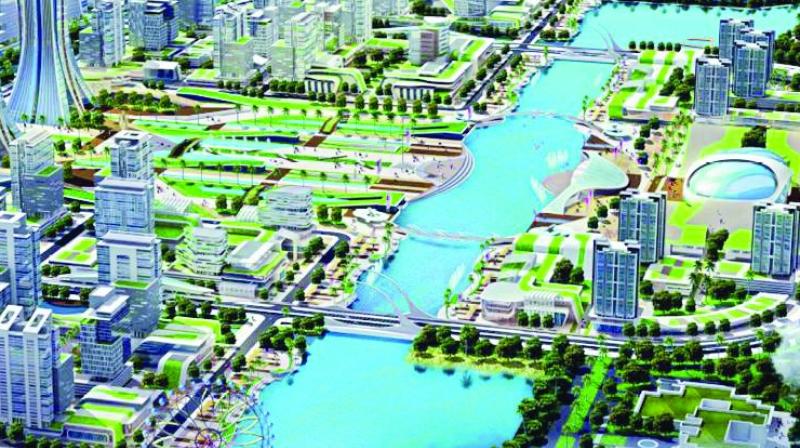AP will speed up economic cities
Government has earmarked six such cities in the state.;

Vijayawada: The State Government has speeded up the process of construction of economic cities. At least two cities are expected to be completed by December 2018. Chief Secretary Dinesh Kumar has been drawing up an action plan. He has taken up a study along with a team of bureaucrats and he has simultaneously been monitoring the construction work.
Economic cities will come up in Guntur, Vijayawada, Visakhapatnam, Kurnool, Rajahmundry, and Veduruvada. Their main purpose will be to provide high-quality physical infrastructure – electricity, water, gas, cooling, roads, telecom and broadband, to provide finance and technology firms with an opportunity to relocate their operations from cities like Mumbai, Bangalore, and Gurgaon, where the infrastructure is either inadequate or extremely expensive.
The economic cities will have special economic zones (SEZ), international education zones, integrated townships, entertainment zones, hotels, convention centres, international techno-parks, units of the Software Technology Parks of India (STPI), shopping malls, stock exchanges and service units.
They will also have extensive transportation networks to ensure accessibility, easy mobility, and low incidences of road accident-related deaths.
Bureaucrats and experts in the fields of infrastructure and transport have held a series of meetings over the past few months, in which they have discussed the development of multi-modal transport systems, the use walk-to-work concepts as part of the urban planning process, implementation of a 10:90 nodal split between private and public transport systems, and the use of electric Personnel Rapid Transport systems within the city. The cities will have commercial towers of around 27 storeys each.
Hyderabad’s economic city has been successful at attracting many major IT companies. It has developed into a hub for many businesses including trade, transport, commerce, communication and IT.
A bureaucrat who is closely monitoring the political and developmental growth under the TD Government, says that the current socioeconomic trends suggest that the administrative vision of Chief Minister N. Chandrababu Naidu will have to be implemented and a number of such cities will have to be constructed and developed in Andhra Pradesh in order to meet the existing challenges.
In order to support the development of new cities which address the challenges of urban transport and mobility, water distribution, and waste management, the AP government is compiling a comprehensive, supportive policy framework for urbanisation.
The framework will establish key guiding principles and identify enablers such as technology, financing and talent attraction, which will be crucial to the implementation of new, livable and sustainable urban spaces, the bureaucrat says.
More land likely for biz cities
The State Government may allot more land for the development of economic cities, as the present allocation of 1000 acres will be insufficient for the construction of six cities. As per international standards, each economic city will require a minimum of 500 acres to accommodate the necessary facilities, says a bureaucrat.
The government is keen on showcasing the development brought about under its regime in its campaign for the upcoming Assembly elections plans to complete the construction of two economic cities by December 2018.
The CS and his team have studied the plans of Lavasa, the first planned hill station constructed in Maharashtra. The city, which was developed primarily by the Hindustan Construction Company, is set amidst seven hills. It occupies 25,000 acres and has 60 km of lakefront.
The concept of private cities is gradually gaining acceptance across the country. A bureaucrat engaged in infrastructure projects in the capital region says that the CM is trying to implement a similar formula in AP. “There are private housing and commercial complexes such as those of DLF in Delhi and Hiranandani in Mumbai, where the security, maintenance of the estates are managed by the developers,” he says.

